Items filtered by date: April 2025
Understanding Hammertoe
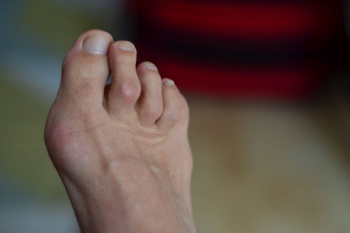
Hammertoe is a foot deformity in which one or more of the smaller toes bend abnormally at the middle joint, creating a curled or hammer-like appearance. This condition often develops gradually and can become rigid over time if not treated. Common causes include an imbalance in the muscles or tendons that control toe movement, often triggered by wearing tight or ill-fitting shoes that crowd the toes. Repeated pressure and friction can worsen the deformity. Risk factors include having a longer second toe, certain inherited foot structures, or conditions such as arthritis and diabetes. Wearing high heels or shoes with narrow toe boxes may also increase the likelihood of developing hammertoe. If you have signs of hammertoe, it is suggested that you are under the care of a podiatrist who can offer effective relief and treatment methods.
Hammertoe
Hammertoes can be a painful condition to live with. For more information, contact one of our podiatrists from Waterbury Podiatry Consultants. Our doctors will answer any of your foot- and ankle-related questions.
Hammertoe is a foot deformity that affects the joints of the second, third, fourth, or fifth toes of your feet. It is a painful foot condition in which these toes curl and arch up, which can often lead to pain when wearing footwear.
Symptoms
- Pain in the affected toes
- Development of corns or calluses due to friction
- Inflammation
- Redness
- Contracture of the toes
Causes
Genetics – People who are genetically predisposed to hammertoe are often more susceptible
Arthritis – Because arthritis affects the joints in your toes, further deformities stemming from arthritis can occur
Trauma – Direct trauma to the toes could potentially lead to hammertoe
Ill-fitting shoes – Undue pressure on the front of the toes from ill-fitting shoes can potentially lead to the development of hammertoe
Treatment
Orthotics – Custom made inserts can be used to help relieve pressure placed on the toes and therefore relieve some of the pain associated with it
Medications – Oral medications such as anti-inflammatories or NSAIDs could be used to treat the pain and inflammation hammertoes causes. Injections of corticosteroids are also sometimes used
Surgery – In more severe cases where the hammertoes have become more rigid, foot surgery is a potential option
If you have any questions please contact our offices located in Waterbury and Southington, CT . We offer the newest diagnostic and treatment technologies for all your foot and ankle needs.
Wounds That Don't Heal Need to Be Checked
Facts About Bunionettes
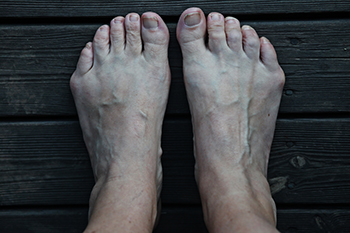
A bunionette, also known as a tailor’s bunion, is a bony bump that forms on the outside of the foot, near the little toe. It can cause pain, swelling, and difficulty wearing certain shoes, often leading to irritation or redness. Symptoms include a noticeable bump, discomfort when walking, and soreness when pressure is applied. Bunionettes result from wearing tight or ill-fitting shoes, genetic factors, or abnormal foot mechanics. Over time, these factors can lead to the misalignment of the fifth metatarsal bone. Treatment options range from conservative measures, like wearing wider shoes and using padding, to more advanced interventions, including surgery. A podiatrist can diagnose the condition and recommend the best treatment plan, whether it includes non-invasive methods or surgical correction. If you are experiencing pain or discomfort from a bunionette, it is suggested that you schedule an appointment with a podiatrist to explore your treatment options and find relief.
If you are suffering from bunion pain, contact one of our podiatrists of Waterbury Podiatry Consultants. Our doctors can provide the care you need to keep you pain-free and on your feet.
What Is a Bunion?
Bunions are painful bony bumps that usually develop on the inside of the foot at the joint of the big toe. As the deformity increases over time, it may become painful to walk and wear shoes. Women are more likely to exacerbate existing bunions since they often wear tight, narrow shoes that shift their toes together. Bunion pain can be relieved by wearing wider shoes with enough room for the toes.
Causes
- Genetics – some people inherit feet that are more prone to bunion development
- Inflammatory Conditions - rheumatoid arthritis and polio may cause bunion development
Symptoms
- Redness and inflammation
- Pain and tenderness
- Callus or corns on the bump
- Restricted motion in the big toe
In order to diagnose your bunion, your podiatrist may ask about your medical history, symptoms, and general health. Your doctor might also order an x-ray to take a closer look at your feet. Nonsurgical treatment options include orthotics, padding, icing, changes in footwear, and medication. If nonsurgical treatments don’t alleviate your bunion pain, surgery may be necessary.
If you have any questions, please feel free to contact our offices located in Waterbury and Southington, CT . We offer the newest diagnostic and treatment technologies for all your foot care needs.
When Your Feet Stop Talking to Your Brain
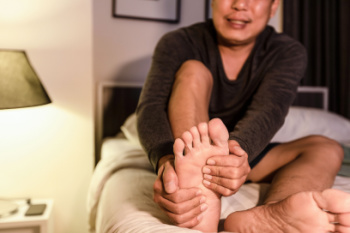
Your feet are constantly sending messages to your brain, about temperature, pain, and pressure, until one day, they do not. Foot neuropathy occurs when nerve damage disrupts these signals, leading to numbness, tingling, burning pain, or even a complete loss of sensation. For some, it starts subtly, like pins and needles that come and go. For others, it is sharp, electric-like pain that worsens at night. Diabetes is a major cause, but injuries, infections, chemotherapy, and even vitamin deficiencies can trigger nerve damage. The danger in this is that without feeling pain, small cuts or pressure sores can go unnoticed, leading to serious complications. There is no quick fix, but early intervention helps slow progression. Managing underlying conditions, improving circulation, and using protective footwear can reduce discomfort. If your feet feel different than they used to, it is suggested that you see a podiatrist for evaluation and appropriate treatment.
Neuropathy
Neuropathy can be a potentially serious condition, especially if it is left undiagnosed. If you have any concerns that you may be experiencing nerve loss in your feet, consult with one of our podiatrists from Waterbury Podiatry Consultants. Our doctors will assess your condition and provide you with quality foot and ankle treatment for neuropathy.
What Is Neuropathy?
Neuropathy is a condition that leads to damage to the nerves in the body. Peripheral neuropathy, or neuropathy that affects your peripheral nervous system, usually occurs in the feet. Neuropathy can be triggered by a number of different causes. Such causes include diabetes, infections, cancers, disorders, and toxic substances.
Symptoms of Neuropathy Include:
- Numbness
- Sensation loss
- Prickling and tingling sensations
- Throbbing, freezing, burning pains
- Muscle weakness
Those with diabetes are at serious risk due to being unable to feel an ulcer on their feet. Diabetics usually also suffer from poor blood circulation. This can lead to the wound not healing, infections occurring, and the limb may have to be amputated.
Treatment
To treat neuropathy in the foot, podiatrists will first diagnose the cause of the neuropathy. Figuring out the underlying cause of the neuropathy will allow the podiatrist to prescribe the best treatment, whether it be caused by diabetes, toxic substance exposure, infection, etc. If the nerve has not died, then it’s possible that sensation may be able to return to the foot.
Pain medication may be issued for pain. Electrical nerve stimulation can be used to stimulate nerves. If the neuropathy is caused from pressure on the nerves, then surgery may be necessary.
If you have any questions, please feel free to contact our offices located in Waterbury and Southington, CT . We offer the newest diagnostic and treatment technologies for all your foot care needs.
Foot Health For Seniors
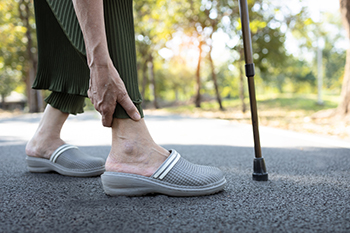
Elderly foot care is essential, as aging can lead to various foot conditions like arthritis, stress fractures, and fallen arches. Arthritis in the feet causes joint pain, swelling, and stiffness, often making walking difficult. Stress fractures, which are small cracks in the bones, can result from weakened bones and repetitive stress, causing pain, swelling, and difficulty bearing weight. Fallen arches, or flat feet, occur when the arches of the feet collapse, leading to pain and discomfort in the feet, knees, or lower back. These conditions can result from the natural aging process, loss of bone density, or prior injuries. The pain and discomfort can significantly affect mobility and quality of life. A podiatrist can help by providing treatments such as custom orthotics, pain management, targeted exercises, or, in some cases, surgery. They can also recommend footwear modifications to alleviate pressure and improve comfort. If you are dealing with foot pain, it is suggested that you make an appointment with a podiatrist.
If you need your feet checked, contact one of our podiatrists of Waterbury Podiatry Consultants. Our doctors will attend to all of your foot and ankle needs and provide you with quality treatment.
Geriatrics and Podiatry
When people age, some common issues that may occur are bone density loss, dry skin, poor circulation, and rough brittle nails. These issues may also affect your foot health if the necessary steps are not taken to alleviate the problems.
It is important to take care of your feet because feet that are injured or diseased can affect your overall health. Having painful feet hinders your ability to do daily activities or may decrease your willingness to do the things that you need to do.
Visiting Your Geriatrician
As we age, health problems become more likely, so it is essential to visit your doctor for check-ups to ensure that you are doing the best you can to take care of your health. It is recommended to check your feet frequently for any possible cuts, bruises, swelling, corns or any other irregularities.
Taking Care of Elderly Feet
Cracked or dry feet can be treated by applying moisturizer often. It is also important not to wear old socks because the older the sock is, the higher the possibility there will be that there is bacteria there. Wear fresh socks and make sure they fit properly.
Proper foot health means that you can have a more active lifestyle and you will not be bogged down by pain. Foot health also leads to good circulation, which is paramount for overall health.
If you have any questions, please feel free to contact our offices located in Waterbury and Southington, CT . We offer the newest diagnostic tools and technology to treat your foot and ankle needs.
Causes of Foot Pain During Pregnancy
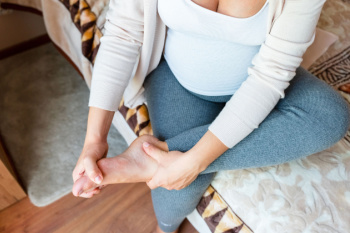
Pregnancy brings many changes to the body, including foot pain caused by factors such as edema and flat feet. Swelling, or edema, occurs due to increased fluid retention and pressure on the veins, leading to discomfort and tenderness in the feet. Flat feet develop as hormonal changes loosen ligaments, causing the arches to flatten and resulting in strain on the muscles and joints. To alleviate discomfort, reducing salt intake can help minimize fluid retention, while maintaining a balanced diet supports overall circulation and tissue health. Gentle foot stretches improve flexibility and relieve tension, providing additional comfort. If foot pain is causing you difficulty completing daily tasks, it is suggested that you visit a podiatrist who can treat various foot conditions, and offer you additional relief methods.
Pregnant women with swollen feet can be treated with a variety of different methods that are readily available. For more information about other cures for swollen feet during pregnancy, consult with one of our podiatrists from Waterbury Podiatry Consultants. Our doctors will attend to all of your foot and ankle needs.
What Foot Problems Can Arise During Pregnancy?
One problem that can occur is overpronation, which occurs when the arch of the foot flattens and tends to roll inward. This can cause pain and discomfort in your heels while you’re walking or even just standing up, trying to support your baby.
Another problem is edema, or swelling in the extremities. This often affects the feet during pregnancy but tends to occur in the later stages.
How Can I Keep My Feet Healthy During Pregnancy?
- Wearing orthotics can provide extra support for the feet and help distribute weight evenly
- Minimize the amount of time spent walking barefoot
- Wear shoes with good arch support
- Wear shoes that allow for good circulation to the feet
- Elevate feet if you experience swelling
- Massage your feet
- Get regular, light exercise, such as walking, to promote blood circulation to the feet
If you have any questions please feel free to contact our offices located in Waterbury and Southington, CT . We offer the newest diagnostic and treatment technologies for all your foot and ankle needs.

